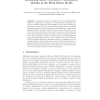19 search results - page 2 / 4 » Lower Bounds for Randomized Consensus under a Weak Adversary |
WADS
2007
Springer
13 years 11 months ago
2007
Springer
Abstract. Assumptions about node density in the Sensor Networks literature are frequently too strong or too weak. Neither absolutely arbitrary nor uniform deployment seem feasible ...
OPODIS
2007
13 years 6 months ago
2007
In Sensor Networks, the lack of topology information and the availability of only one communication channel has led research work to the use of randomization to deal with collisio...
APPROX
2010
Springer
13 years 6 months ago
2010
Springer
We initiate the study of multi-source extractors in the quantum world. In this setting, our goal is to extract random bits from two independent weak random sources, on which two q...
ICDT
2009
ACM
14 years 6 months ago
2009
ACM
We continue the study of approximating the number of distinct elements in a data stream of length n to within a (1? ) factor. It is known that if the stream may consist of arbitra...
STOC
2003
ACM
14 years 5 months ago
2003
ACM
In this paper, we present the first average-case analysis proving an expected polynomial running time for an exact algorithm for the 0/1 knapsack problem. In particular, we prove,...

